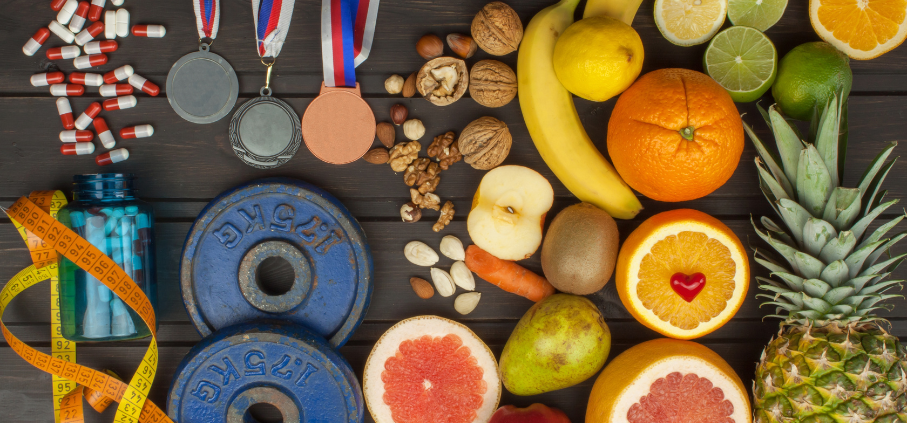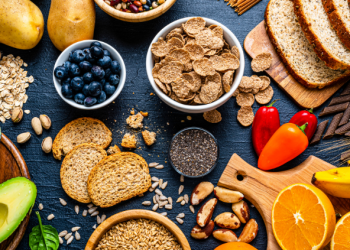What Should Athletes Eat to Fuel Peak Performance?

Athletes, driven by the pursuit of peak performance, have been in the spotlight for numerous studies exploring how various dietary patterns optimize performance. Due to the breadth of research and recommendations available, athletes are at a crossroads when determining the best way to fuel their goals. For this reason, our Stanford Lifestyle Medicine team members (Matt Kaufman, MD, Maya Shetty, BS, Michael Fredericson, MD, and Marily Oppezzo, PhD) reviewed the research regarding how popular diets impact athletic performance and well-being. They summarized their findings in a comprehensive research article titled Popular Dietary Trends’ Impact on Athletic Performance: A Critical Analysis Review, which was recently published in the journal Nutrients. Their research focused on six dietary patterns: Mediterranean diet, ketogenic diet, low-carbohydrate diet, plant-based diet, intermittent fasting, and disordered eating. Whether you are an elite athlete or an enthusiastic beginner, keep reading to learn more.
Mediterranean Diet
The Mediterranean diet, rich in whole grains, unsaturated fats, lean proteins, fruits, and vegetables, is consistently associated with improved health and performance for athletes. Research on athletes finds this diet is linked to improved muscle power and endurance, as well as body composition. The low inflammatory index of this diet is also associated with enhanced recovery time.
Ketogenic Diet
The ketogenic diet restricts the consumption of carbohydrates and protein to boost the use of fat as an energy source, thus improving weight loss and potentially athletic performance. While this may help athletes, such as wrestlers, who need to stay within specific weight requirements, the prolonged carbohydrate restriction can negatively affect training performance. Research has shown this restriction can increase baseline heart rates, perceived exertion, and rate of bone loss, harming short and long-term performance. However, research has not found significant decrements in performance for athletes following this diet.
Low-Carbohydrate Diet
People often think that Ketogenic and Low-Carbohydrate diets are the same. A low-carbohydrate diet is less restrictive and does not restrict protein intake in the same way that Ketogenic diets would. Research has found that athletes on this diet have no differences in muscle strength and power compared to athletes following a regular diet. However, notable improvements in sprint times and exhaustion perceptions have been observed. As carbohydrates are restricted, the same detriments on performance found in ketogenic diet research may occur. Studies examining low-carbohydrate diets use extremely variable interventions that are difficult to compare. Thus, more research is needed to determine its specific impact on performance.
Plant-Based Diet
Plant-based diets are also adopted by many athletes due to ethical or health-conscious reasons. This choice is supported by the literature, which suggests that vegetarian and vegan athletes perform just as well in terms of endurance and strength as their omnivorous counterparts. Following a plant-based diet can have numerous health benefits. Plant-based protein sources, such as tofu, lentils, and beans, have been found to improve circulation, reduce inflammation, lower oxidative stress, promote a healthy gut microbiome, enhance glycogen stores, and support leaner body weights.
However, due to the restrictions of these dietary patterns, following them without proper planning may lead to nutritional deficiencies, such as protein, vitamins B12 and D, iron, zinc, calcium, total calories, and iodine. These deficiencies may affect performance, recovery, and bone health. Despite the risk of these deficiencies, staying attentive to one’s nutritional needs and working with a sports dietician can help you to either take the right supplements or plan a plant-based diet that meets all your needs.
Dr. Matthew Kaufman, the lead author of the review paper, states, “Because plant-based diets are high in carbohydrates, low in fat, and rich in vitamins, minerals, and antioxidants, they can provide important nutrients an athlete needs for performance. In order to maximize a plant-based diet for training and competition, athletes may want to consult with a sports dietitian to ensure adequate nutrient intake and to get well-balanced examples of nutritionally fulfilling meals.”
Intermittent Fasting
Intermittent fasting, with its varying protocols, involves limiting the time window for eating during the day. This dietary pattern might not be suitable for athletes given their training schedules or the nutrition to fuel performance. As a result, the potential risks may outweigh the benefits. Limited eating windows may be helpful for weight loss or maintaining a strict weight class, but it can also lead to low energy availability and actually harm performance and overall health. Research studies have found that intermittent fasting impaired athletes’ sprint speed and endurance.
Disordered Eating
The pressure to maintain a low body weight for athletics can lead to restrictive diets or even clinical eating disorders, affecting both physical and mental health. These include anorexia nervosa, bulimia nervosa, binge eating disorder, and orthorexia. Athletes, especially those in aesthetics-focused sports such as gymnastics, dance, and ice skating, have the highest rates of disordered eating and eating disorders. These eating patterns can weaken muscles, cause fatigue, and lead to injuries and complications like anemia and osteoporosis. Restrictive diets like ketogenic, plant-based, or intermittent fasting might appeal to athletes with disordered eating tendencies. Thus, athletes should carefully assess their motivations for diet changes and consult professionals to ensure their nutritional needs are met.
To summarize, the researchers found that the Mediterranean diet has the most benefits for athletes regarding recovery and performance. Low-carbohydrate and ketogenic diets show no harm to athletic performance; however, the non-ketogenic low-carbohydrate diets that emphasize protein intake might be more sustainable for the energy demands of athletics. Vegans and vegetarians are at high risk for nutrient deficiencies, especially in nutrients essential for athletic recovery and muscle maintenance. Intermittent fasting may aid weight loss but could hamper athletic performance in endurance and aerobic sports. For any dietary intervention, the reasoning for the change should be closely monitored by the athlete and their healthcare team to ensure disordered eating is not a risk. Restricting the type and amount of food an athlete consumes can severely impact performance and overall well-being.
Dr. Matthew Kaufman, the lead author of this review article, emphasizes, “Nutrition and athletic performance are inextricably linked. The Mediterranean diet is abundant in foods that support the high energy demands of athletes and promote recovery. However, no one diet is universally recommended for athletes, and any dietary changes should be done in collaboration with healthcare professionals to ensure maintenance of overall health.”
Source:
- Kaufman M, Nguyen C, Shetty M, Oppezzo M, Barrack M, Fredericson M. Popular Dietary Trends’ Impact on Athletic Performance: A Critical Analysis Review. Nutrients. 2023 Aug 9;15(16):3511. doi: 10.3390/nu15163511. PMID: 37630702; PMCID: PMC10460072.




















